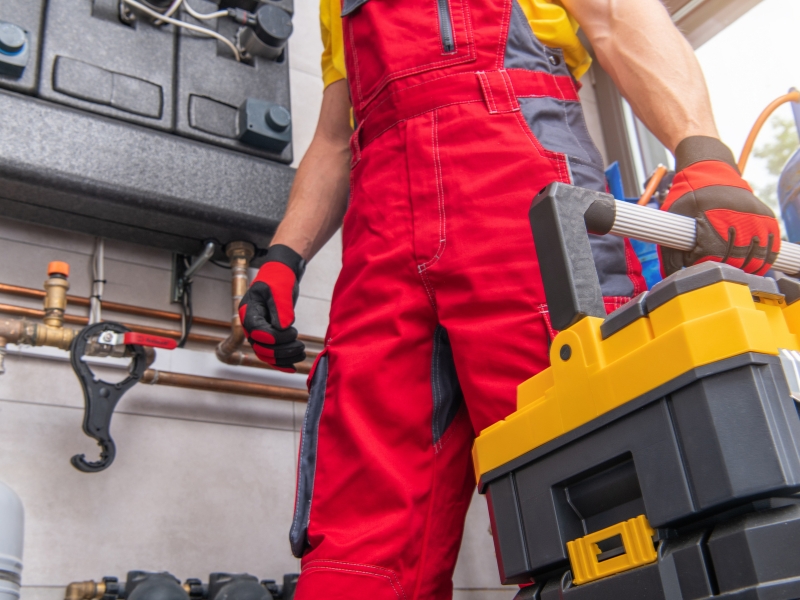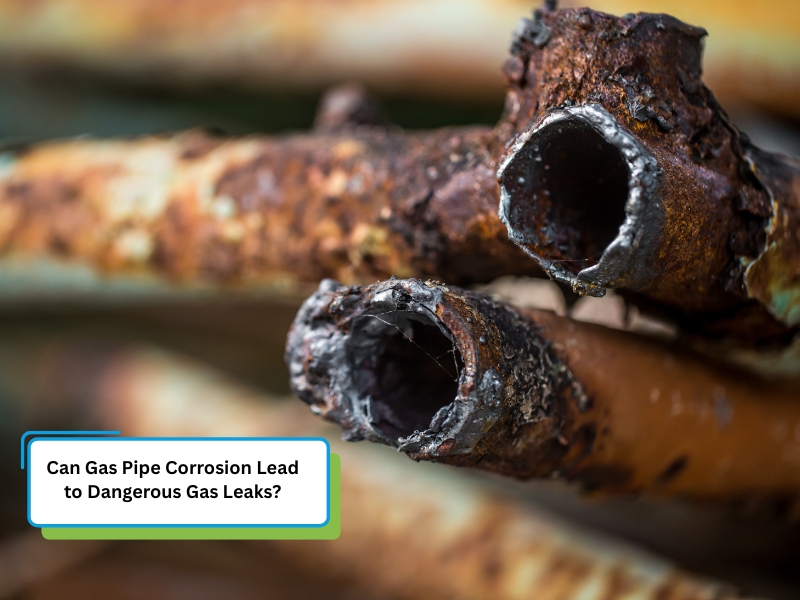Gas pipe corrosion is a widespread issue that can pose serious safety risks to your home or business. As pipes degrade, they become increasingly susceptible to leaks, resulting in dangerous consequences, including explosions and exposure to harmful gases. This article delves into the causes of corrosion, its potential hazards, and the preventive measures you can take to safeguard your property and ensure a secure environment.
Why does gas pipe corrosion occur?
Gas pipe corrosion is a slow process caused by environmental and material factors that weaken pipe integrity and increase safety risks. These factors can significantly weaken the integrity of the pipes, leading to potential safety risks. Here are the key causes of gas pipe corrosion:
- Moisture exposure: Water accelerates corrosion, particularly when pipes are exposed to moisture or high humidity.
- Environmental factors: The temperature and soil conditions where the pipes are installed can affect the corrosion rate.
- Pipe material: Older steel or cast iron pipes are more vulnerable to corrosion than newer materials like copper and plastic.
- Poor installation: Improper installation can expose pipes to conditions that promote corrosion, like physical damage or incorrect sealing.
Gas pipe corrosion occurs when environmental factors like moisture and poor installation damage the pipe material. Over time, these factors can weaken the pipe, leading to potential leaks.
When does corrosion become a safety issue?
Corrosion becomes a serious safety issue when it compromises the structural integrity of the gas pipes. While small signs of corrosion may seem minor, they can escalate into major hazards, such as gas leaks or even explosions over time. Here are the warning signs that corrosion is becoming a concern:
- Visible rust or discolouration: This is an early indicator that the pipe is corroding.
- Unusual gas smell: A gas leak, often indicated by a distinctive rotten egg smell, can arise from corroded pipes.
- Higher gas bills: Leaks from corroded pipes lead to inefficient gas usage, which is reflected in increased utility costs.
- Noise: Hissing or whistling sounds around the pipes may indicate gas escaping.
Gas pipe corrosion becomes a safety concern when it leads to leaks. Signs such as rust, unusual smells, and increased gas usage should not be ignored.
Is gas pipe corrosion covered by insurance or compliance laws?
Gas pipe corrosion isn’t just a maintenance issue—it can be a legal and financial concern. Homeowners and businesses alike often wonder if insurance policies or compliance regulations offer protection. Understanding where coverage begins and ends, and what laws apply, is key to staying safe and avoiding costly penalties.
| Aspect | Covered by Insurance? | Regulated by Law? |
| Old corroded pipes | Sometimes | Yes |
| Sudden gas leaks | Often | Yes |
| Routine maintenance | No | Yes |
| Replacement costs | Rarely | No |
| Compliance inspections | No | Yes |
Gas pipe corrosion may be covered by insurance if it leads to sudden damage, but not if it’s due to neglect. Under Australian gas safety standards and regulations, ongoing maintenance and regular inspections are legal requirements to ensure system safety.
Who should inspect and maintain your gas pipes?
A licensed professional should always handle gas pipe care to ensure safety and efficiency. An experienced plumber specialising in gas fitting will be able to detect early signs of corrosion and recommend appropriate repairs or replacements before they lead to serious issues. Here’s what to look for when choosing a plumber:
- Licensing and experience: Ensure the plumber is properly licensed and has a proven track record in gas pipe repairs. This ensures they are qualified to handle potentially hazardous work.

- Routine inspections: Schedule regular inspections with your plumber to keep your gas system in optimal condition. Routine checks help catch potential issues early, preventing costly repairs.
- Reputation: Opt for a plumber with a solid reputation for safety, reliability, and quality service. Online reviews or word-of-mouth recommendations can help you find trustworthy professionals.
A licensed and experienced plumber should regularly inspect and maintain your gas pipes to prevent corrosion and other issues, ensuring your gas system’s long-term safety and functionality. To ensure safety with expert gas fittings in Sydney, it’s important to rely on professionals who can address potential risks and keep your system in optimal condition.
How to prevent and treat gas pipe corrosion
Correct installation and regular care are the first steps in preventing gas pipe corrosion. By taking proactive measures, you can significantly reduce the risk of corrosion and extend the lifespan of your pipes. Here are prevention and treatment strategies:
- Use corrosion-resistant materials: Replace old pipes with less corrosion-resistant materials, such as copper or plastic.
- Sealing the pipes: Proper sealing prevents moisture from coming into contact with the pipes.
- Regular inspections: Schedule regular inspections to catch any signs of wear and tear before they become serious issues.
- Address problems quickly: If corrosion is detected, repair or replace the affected pipe sections promptly.
Preventing gas pipe corrosion involves using durable materials, sealing pipes, and scheduling routine inspections. Addressing problems early helps avoid serious risks.
Are certain homes or locations more at risk?
Certain homes and locations are more susceptible to gas pipe corrosion due to specific environmental and property-related factors. These conditions can accelerate the degradation of pipes, increasing the likelihood of leaks and safety hazards. Key risk factors include:
- Coastal locations: Saltwater and salty air significantly accelerate corrosion, making homes near the coast more vulnerable to pipe damage.
- Older properties: Homes with aging gas pipes, especially those made of steel or cast iron, are at a higher risk of corrosion than newer homes that use more modern materials like copper or plastic.
- High-humidity environments: Areas with consistently high moisture levels or excessive rainfall contribute to the rapid breakdown of gas pipes, increasing the corrosion rate.
If your home is located in one of these high-risk areas—coastal, an older property, or a region with high humidity—it’s essential to regularly inspect your gas pipes for signs of corrosion.
Conclusion
Gas pipe corrosion is a significant safety concern that can lead to dangerous gas leaks and explosions. By understanding how corrosion occurs, when it becomes a safety issue, and how to prevent it, you can take the necessary steps to protect your home.
For reliable inspections or help with gas pipe corrosion, you can reach out for professional support. Discover the range of plumbing services offered by Eco Plumbers 24/7.

